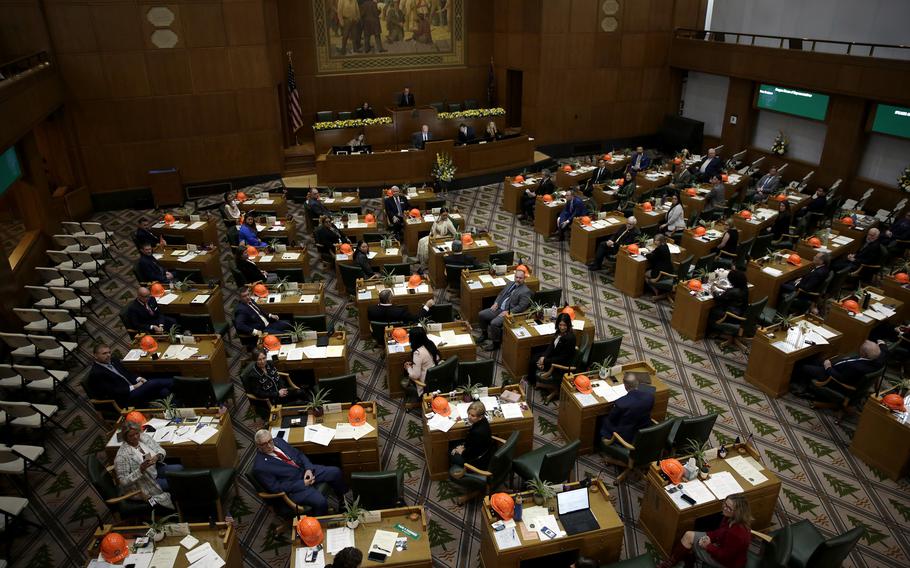
Members of the Oregon House of Representatives in session on Jan. 9, 2023. (AP)
The number of state lawmakers with military experience dropped sharply in the past two years, according to a survey by the National Conference of State Legislatures.
Veterans, current or former reservists, and National Guard members held 748 seats in the 50 state and five territorial legislatures in the United States. That’s slightly more than 10% of the 7,383 legislators serving nationwide, the group said.
The number dropped sharply in two years. The group counted 911 state lawmakers with military experience following the 2020 election.
Jim Reed, an NCSL spokesman, said Thursday that the decline was caused by demographics and term-limit laws.
“There are simply fewer veterans in the general population year to year,” he said.
NCSL said the share of the U.S. population with military experience declined from 18% in 1980 to 6% in 2022.
Accelerating the change is term limits, which force out longer-serving lawmakers who are more likely to have military experience.
“Though other reasons may also contribute to this decline such as resignations or deaths, the number of veterans serving in legislatures in 12 of the 16 term-limited states fell by a total of 45, accounting for 27% of the decline,” Reed said.
The NCSL took up the traditional Veterans Day count of lawmakers from the conservative American Enterprise Institute, which counted more than 1,040 service members in 2018.
Veterans make up about 6.5% of the adult national population, according to the 2020 U.S. Census. But the Department of Veterans Affairs points to an aging group with military experience. Just more than 21% of veterans are younger than age 45. The highest percentage — 41.2% — are between the ages of 45 and 64. Slightly more than 37% of those 65 years or older are veterans.
The lawmakers who have served represent all branches — Army, Navy, Air Force and Marines. They include active-duty retirees and those who transitioned into Reserve roles after long stints in the regular armed forces.
Virginia Sen. Bryce Reeves, a Republican who served as an Army airborne officer, helped organize the NCSL survey. He said leadership skills that he learned in the military have served him well.
“One trait I personally believe anyone who has worn the cloth of our country has, is the ability to analyze complex issues and find positive solutions quickly,” Reeves said.
California Sen. Tom Umberg, a Democrat who retired in 2010 as an Army colonel, agreed a military background helped lawmakers stay “mission-focused” on difficult tasks, such as a state budget.
“You have a job to accomplish — get it done,” he said. “You can stand up and give your ideological pitch. You can have a vision. But always stay focused on how you will get the job done. Because there is no alternative.”
While state lawmakers with military backgrounds can range from liberal Democrats to conservative Republicans, Reeves said one thing that they generally agree upon is supporting those who serve in uniform today.
“We enhance our military readiness by taking care of our active, reserve and military families,” he said.
The NCSL survey shows the pool of veterans differs from state to state, but demographic trends make it unlikely that legislatures could ever have a majority of members who served in the military. Alaska tops the current list, with more than 18% of its members having military experience. Colorado is second with 15%.
Legislatures come in different sizes. Relatively small New Hampshire has the largest number of legislators (424) and the largest number of those who are veterans (72).
The other top four states for lawmakers with military experience are Georgia (34), Missouri (30) and Pennsylvania (27).
States with 15% or more legislators having had military experience also include Alabama, Idaho, Missouri, Montana, New Hampshire, North Dakota, Ohio, Tennessee, Virginia and Wyoming.
On the other end of the spectrum, Nevada has four legislators with military experience, the smallest number in the nation. Maine has the lowest percentage — 4.3%.
States where less than 8% of legislators having military experience include Alabama, Arkansas, California, Connecticut, Hawaii, Illinois, Louisiana, Massachusetts, Minnesota, New Jersey, New Mexico, Rhode Island, South Dakota and Utah.